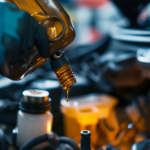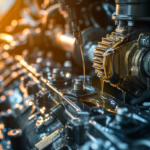Want to keep your car’s engine running smoothly for years to come? Follow these simple tips to extend its life. Regularly change the oil, maintain proper fluid levels, and keep the engine clean. Use high-quality fuel and stick to the manufacturer’s maintenance schedule. Avoid overloading the vehicle and drive smoothly. Don’t forget to regularly check and replace filters, and address any warning signs promptly. With these easy steps, you’ll ensure your car’s engine stays in top shape.
Regular Oil Changes
To keep your car’s engine running smoothly, you should make sure to regularly change the oil. Changing the oil at the recommended intervals is essential for maintaining the health and longevity of your engine. Over time, engine oil collects dirt, debris, and contaminants that can cause damage if left unaddressed. Regular oil changes help to remove these harmful particles and prevent them from circulating through your engine. Fresh oil also provides better lubrication, reducing friction and wear on engine components. By neglecting oil changes, you risk decreased engine performance, reduced fuel efficiency, and even engine failure. So, remember to schedule regular oil changes and follow the manufacturer’s recommendations to ensure the continued smooth operation of your car’s engine.
Properly Maintain Fluid Levels
To properly maintain fluid levels in your car, there are a few key points to keep in mind. First, regular oil changes are essential to ensure your engine stays lubricated and running smoothly. Additionally, it’s important to regularly check your coolant levels to prevent overheating, and to monitor your transmission fluid to ensure smooth gear shifts. By staying on top of these fluid levels, you can help extend the life of your car’s engine.
Regular Oil Changes
Make sure you regularly check and change your car’s oil to properly maintain fluid levels and extend the life of your engine. Regular oil changes are crucial for keeping your engine running smoothly and preventing costly repairs. Oil lubricates the moving parts of your engine, reducing friction and heat. Over time, oil breaks down and becomes contaminated with dirt and debris, which can cause engine damage if not addressed. By changing your oil at the recommended intervals, you ensure that fresh, clean oil is circulating through your engine, providing optimal lubrication and cooling. Additionally, regular oil changes also allow for the removal of any harmful sludge or deposits that may have accumulated. So, make it a habit to check your oil levels regularly and schedule oil changes as recommended by your car’s manufacturer to keep your engine running strong for years to come.
Check Coolant Levels
By regularly checking and topping up your coolant levels, you can properly maintain fluid levels and ensure the longevity of your car’s engine. Coolant, also known as antifreeze, plays a crucial role in keeping your engine cool and preventing overheating. To check the coolant levels, start by locating the coolant reservoir under the hood. Make sure the engine is cool before removing the cap. The coolant level should be between the minimum and maximum marks on the reservoir. If it’s low, add a mixture of coolant and water to bring it up to the proper level. It’s important to use the correct type of coolant recommended by your car’s manufacturer. Neglecting to check and top up your coolant levels can result in engine damage and costly repairs. So, make it a habit to regularly check and maintain proper coolant levels to keep your engine running smoothly.
Monitor Transmission Fluid
Keep an eye on your transmission fluid levels to ensure proper maintenance and longevity of your car’s engine. The transmission fluid plays a crucial role in keeping your transmission system running smoothly. It lubricates the moving parts and helps to regulate the temperature, preventing excessive wear and tear. To monitor your transmission fluid, start by locating the dipstick under the hood of your car. Make sure the engine is warm and running, then pull out the dipstick, wipe it clean, and reinsert it. Pull it out again and check the fluid level. If it’s below the recommended level, add more fluid as needed. It’s important to maintain the proper fluid levels to avoid costly transmission repairs and extend the life of your engine.
Keep the Engine Clean
To keep your engine running smoothly and extend its lifespan, there are a few key points to consider. First, regular oil changes are crucial for maintaining engine cleanliness and lubrication. Additionally, avoiding excessive idling can prevent the buildup of carbon deposits and prolong the life of your engine.
Regular Oil Changes
You should regularly change your car’s oil to help keep the engine clean. Oil plays a crucial role in the engine’s performance by lubricating the moving parts and reducing friction. Over time, oil breaks down and becomes contaminated with dirt, debris, and other contaminants, which can lead to engine damage and decreased efficiency. By changing your car’s oil at regular intervals, you remove the old, dirty oil and replace it with fresh, clean oil. This helps to remove the accumulated contaminants, preventing them from causing any harm to the engine. Regular oil changes also ensure that the engine is properly lubricated, reducing wear and tear on the internal components and improving overall performance. So, make sure to schedule those oil changes to keep your engine running smoothly and efficiently for years to come.
Avoid Excessive Idling
If you want to extend the life of your car’s engine, it’s important to avoid excessive idling as it can contribute to engine buildup and decreased performance. Excessive idling occurs when you leave your engine running for long periods of time while stationary, such as when waiting in traffic or while parked. When you idle for extended periods, the engine doesn’t reach its optimal operating temperature, which can lead to the formation of deposits and carbon buildup. These deposits can clog the fuel injectors, reduce fuel efficiency, and impact overall engine performance. Additionally, excessive idling can also cause oil dilution, where fuel can seep into the engine oil, reducing its lubricating properties. Therefore, it’s advisable to turn off your engine if you anticipate being stationary for more than a minute or two to keep your engine clean and running smoothly.
Use High-Quality Fuel
Using consistently high-quality fuel can significantly improve the performance and longevity of your car’s engine. When you opt for high-quality fuel, you ensure that your engine receives cleaner and more efficient combustion. This means that there will be fewer impurities and deposits that can clog your fuel injectors and other engine components. High-quality fuel also contains a balanced blend of additives, such as detergents and lubricants, which help to keep your engine running smoothly. These additives can prevent the buildup of carbon deposits on your engine valves and cylinders, reducing the risk of engine knock and improving fuel efficiency. By using high-quality fuel, you not only enhance your engine’s performance but also extend its lifespan, saving you from costly repairs and replacements in the long run.
Follow the Manufacturer’s Maintenance Schedule
To ensure optimal performance and longevity of your car’s engine, it is important to regularly follow and adhere to the manufacturer’s maintenance schedule. The maintenance schedule provided by the manufacturer is specifically designed to address the needs of your vehicle and keep it running smoothly. It includes routine tasks such as oil changes, filter replacements, and inspections that are crucial for the health of your engine. By following this schedule, you can prevent potential issues from escalating into costly repairs. Neglecting to adhere to the maintenance schedule may result in decreased fuel efficiency, reduced engine power, and even engine failure. Therefore, it is essential to make a habit of scheduling regular maintenance appointments and ensuring that all recommended services are performed on time. Your car’s engine will thank you for it!
Avoid Overloading the Vehicle
Make sure you don’t exceed the maximum weight capacity of your vehicle to avoid overloading it and putting unnecessary strain on the engine. Overloading your vehicle can lead to a range of problems, including decreased fuel efficiency, increased wear and tear on the engine, and even potential damage to the suspension and braking systems. When you exceed the weight limit, the engine has to work harder to move the additional weight, which can result in decreased performance and increased risk of breakdowns. To avoid overloading, always check the vehicle’s manual or consult the manufacturer’s guidelines for the maximum weight limit. Additionally, be mindful of the weight distribution and avoid placing heavy objects on the roof, as it can affect the vehicle’s stability and handling. By avoiding overloading your vehicle, you can help extend the life of your engine and ensure a smoother driving experience.
Drive Smoothly and Avoid Aggressive Driving
To ensure the longevity of your car’s engine, drive smoothly and avoid aggressive driving. Aggressive driving habits, such as rapid acceleration, sudden braking, and excessive speeding, can put unnecessary stress on your engine. When you accelerate quickly, it forces the engine to work harder, causing increased wear and tear on its components. Similarly, slamming on the brakes abruptly can strain the brake system and lead to premature wear. By driving smoothly, you can maintain a consistent speed and avoid sudden changes that can strain the engine. Additionally, avoid excessive speeding as it not only puts you at risk but also places unnecessary stress on your engine. By adopting a calm and controlled driving style, you can help extend the life of your car’s engine.
Regularly Check and Replace Filters
Check and replace your car’s filters regularly to keep your engine running smoothly. Filters play a crucial role in maintaining the health of your engine by preventing dirt, debris, and contaminants from entering sensitive parts. The air filter, for example, ensures that only clean air reaches the engine, optimizing combustion and fuel efficiency. Over time, filters can become clogged and dirty, hindering their ability to perform effectively. This can lead to reduced engine performance, decreased fuel economy, and potential damage to engine components. Therefore, it is important to inspect and replace filters according to your vehicle’s maintenance schedule or if you notice signs of reduced airflow or decreased performance. Regularly checking and replacing filters is a simple yet effective way to extend the life of your car’s engine.
Monitor and Address Warning Signs Promptly
Pay attention to any unusual noises or vibrations, and promptly address them to prevent further damage to your car’s engine. Strange sounds or vibrations can indicate underlying problems that, if left unattended, can lead to costly repairs or even engine failure. When you hear a knocking sound, it could be a sign of insufficient lubrication or worn-out engine components. Squealing noises may indicate a loose or worn-out belt, while a grinding sound might suggest a problem with your brakes or transmission. Vibrations can be caused by issues with your tires, suspension, or engine mounts. By promptly addressing these warning signs, you can avoid more extensive damage and potentially save yourself from expensive repairs down the line. Remember, it’s always better to be safe than sorry when it comes to your car’s engine.

Lucas is an experienced vehicle technician with hands-on knowledge of almost every car brand available. Throughout his career, Lucas has worked on a wide range of vehicles, including domestic and foreign models, sports cars, trucks, and SUVs.





